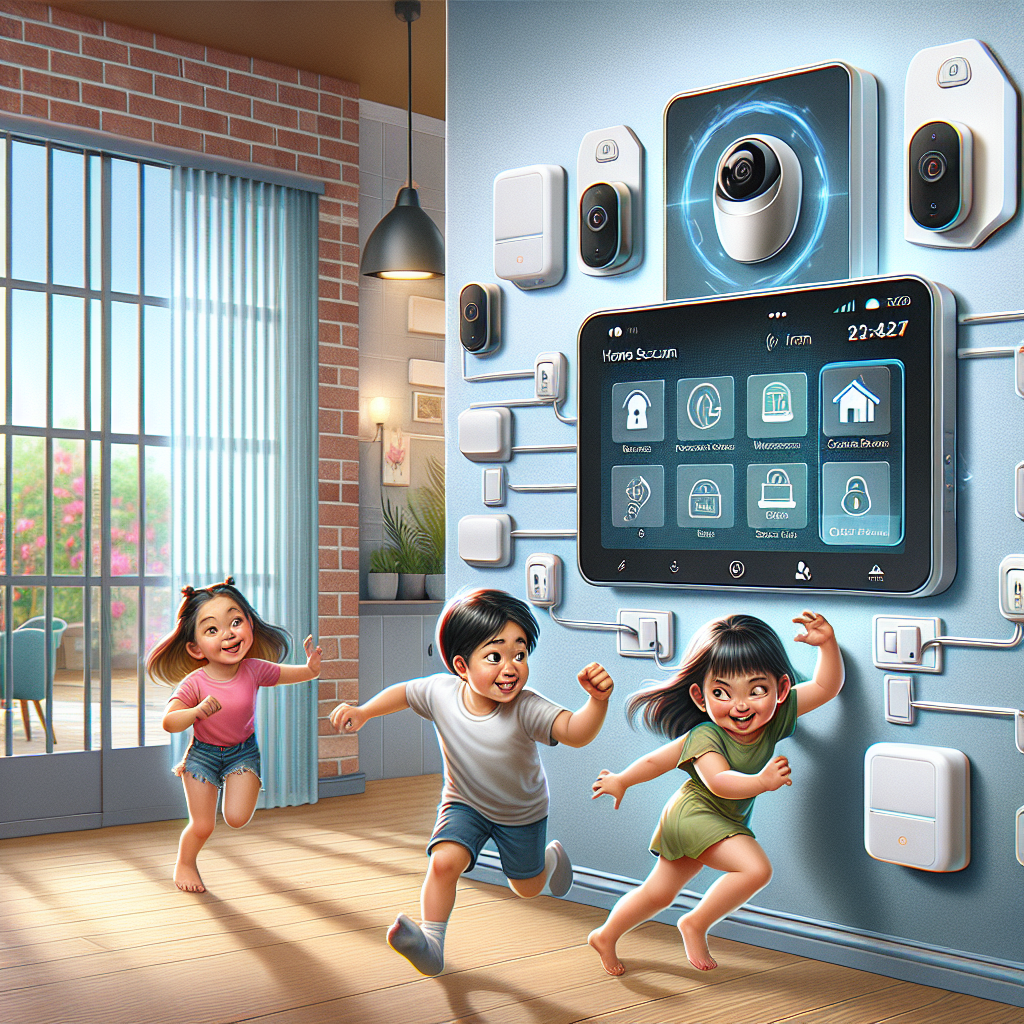As technology continues to advance, the future of home security is evolving with the introduction of smart wireless alarm systems. These innovative systems combine cutting-edge technology with convenience, offering homeowners a seamless way to protect their properties. With features like app-controlled access, real-time notifications, and customizable settings, smart wireless alarm systems provide a sophisticated and efficient way to monitor and secure homes. Offering peace of mind and enhanced security, these systems are quickly becoming the ultimate solution for modern homeowners looking to safeguard their loved ones and belongings. Discover the exciting possibilities of smart wireless alarm systems and take your home security to the next level.
Smart wireless alarm systems have indeed revolutionized home security by offering convenient, easy-to-install options that can be controlled remotely via smartphones. With features like real-time alerts, customization, and compatibility with other smart home devices, they provide comprehensive protection and peace of mind. While not perfect, they are certainly a top contender for being the ultimate solution in home security.
Understanding Smart Wireless Alarm Systems

Smart wireless alarm systems are advanced security solutions designed to protect homes using cutting-edge technology. These systems are revolutionizing the way we think about home security by offering a more flexible, convenient, and efficient way to monitor and protect our living spaces.
Definition of smart wireless alarm systems
Smart wireless alarm systems utilize wireless technology to connect various components of the security system, such as sensors, cameras, and control panels, without the need for cumbersome wiring. These systems can be easily controlled and monitored remotely using a smartphone or other smart devices, providing homeowners with real-time updates on the status of their security.
How they differ from traditional alarm systems
- Traditional alarm systems rely on wired connections between components, which can be complicated to install and may limit where sensors and cameras can be placed.
- Smart wireless alarm systems, on the other hand, offer easy installation without the need for drilling holes or running wires throughout the home.
- Wireless technology also makes these systems more reliable, as there are no vulnerable wires that can be cut to disable the system.
Benefits of using smart wireless alarm systems
- Enhanced flexibility: Smart wireless alarm systems can easily be expanded or reconfigured to accommodate changes in the home layout or security needs.
- Remote monitoring: Homeowners can keep an eye on their property from anywhere in the world using their smart devices, giving them peace of mind even when they are away.
- Integration with other smart home devices: Smart wireless alarm systems can be integrated with other smart home devices, such as smart locks and lights, to create a comprehensive home automation system.
- Improved reliability: Wireless technology reduces the risk of system failures due to damaged wires or power outages, ensuring that the home remains protected at all times.
Key Features of Smart Wireless Alarm Systems
-
Remote monitoring capabilities: Smart wireless alarm systems offer homeowners the ability to monitor their property from anywhere using a smartphone or tablet. This feature allows users to check in on their home in real-time, receive notifications of any suspicious activity, and even remotely arm or disarm the alarm system.
-
Wireless connectivity: Unlike traditional wired alarm systems, smart wireless alarm systems rely on wireless communication protocols such as Wi-Fi, Bluetooth, or Z-Wave. This not only eliminates the need for complex installation processes but also ensures that the system remains operational even in the event of a power outage or cut wires.
-
Integration with smart home devices: One of the key advantages of smart wireless alarm systems is their ability to seamlessly integrate with other smart home devices such as smart locks, cameras, and lighting systems. This interconnected ecosystem allows for a more comprehensive approach to home security, where all devices work together to enhance the overall safety of the property.
-
Customization options for alerts and notifications: Smart wireless alarm systems offer users the flexibility to customize their alerts and notifications based on their individual preferences. Whether it’s receiving instant alerts for a specific entry point or setting up unique notification tones for different sensors, users can tailor the system to suit their needs and lifestyle.
Installation and Setup Process
Installing and setting up a smart wireless alarm system can be a crucial step in enhancing home security. Here are some key considerations for the installation and setup process:
DIY Installation vs. Professional Installation Services
-
DIY Installation: Many smart wireless alarm systems come with user-friendly instructions that allow homeowners to set up the system themselves. This option is often more cost-effective and can be completed at a convenient time.
-
Professional Installation Services: For those who prefer a hands-off approach or lack the technical expertise, professional installation services are available. Professional installers can ensure that the system is set up correctly and can provide guidance on optimizing its performance.
Steps to Set Up a Smart Wireless Alarm System
-
Selecting the Right Location: Begin by identifying strategic locations for the sensors and control panel. Placing sensors near entry points and vulnerable areas can maximize the system’s effectiveness.
-
Connecting the Components: Follow the manufacturer’s instructions to connect the various components of the alarm system, such as sensors, cameras, and the control panel. Ensure that each device is properly linked to the central hub.
-
Configuring Settings: Once the physical installation is complete, it is essential to configure the system settings. This includes setting up notifications, creating user codes, and testing the system to ensure all components are functioning correctly.
Common Challenges During Installation and How to Overcome Them
-
Interference Issues: Wireless alarm systems may experience interference from other electronic devices or thick walls. To overcome this challenge, consider installing signal repeaters or adjusting the placement of components to improve connectivity.
-
Battery Life Concerns: Some wireless devices rely on batteries for power, which can lead to concerns about battery life. To address this issue, regularly monitor battery levels and replace them as needed to ensure uninterrupted functionality.
-
Compatibility Problems: Incompatibility between devices or software can pose a hurdle during installation. To mitigate this issue, ensure that all components are from the same manufacturer or are designed to work together seamlessly.
By carefully navigating the installation and setup process, homeowners can harness the full potential of smart wireless alarm systems to enhance their home security measures.
Compatibility and Integration
Smart wireless alarm systems offer advanced features that prioritize compatibility and integration with other technologies for seamless home security management. Here are key aspects to consider in terms of compatibility and integration:
-
Ensuring compatibility with existing home security devices: Smart wireless alarm systems are designed to work with a variety of existing home security devices such as cameras, sensors, and smart locks. This ensures that homeowners can easily integrate these systems into their current setup without the need for a complete overhaul.
-
Integration with voice assistants like Amazon Alexa and Google Assistant: One of the major advantages of smart wireless alarm systems is their ability to integrate with popular voice assistants such as Amazon Alexa and Google Assistant. This integration allows homeowners to control their security system using voice commands, adding an extra layer of convenience and functionality to the overall setup.
-
Connecting with smartphones and tablets for remote access: Smart wireless alarm systems are designed to connect with smartphones and tablets, enabling homeowners to access and control their security system remotely. This feature allows for real-time monitoring, alerts, and the ability to arm or disarm the system from anywhere, providing enhanced peace of mind and security.

Advantages of Smart Wireless Alarm Systems
Smart wireless alarm systems offer a range of advantages that make them an appealing choice for modern homeowners. Here are some key benefits:
-
Enhanced flexibility and scalability: Unlike traditional wired alarm systems, smart wireless systems can be easily expanded and adapted to suit the changing needs of a household. Additional sensors and devices can be seamlessly integrated without the need for complex rewiring, providing flexibility in customizing the system to fit specific security requirements.
-
Real-time alerts and notifications: One of the standout features of smart wireless alarm systems is their ability to provide instant notifications to homeowners in the event of a security breach or emergency. Through connected mobile applications, users can receive alerts on their smartphones, allowing for quick responses and peace of mind, even when away from home.
-
Increased convenience and ease of use: With intuitive interfaces and remote access capabilities, smart wireless alarm systems offer unparalleled convenience in managing home security. Users can easily arm or disarm the system, check the status of sensors, and monitor their property from anywhere with an internet connection, streamlining the security management process.
-
Energy-efficient operation compared to wired systems: Smart wireless alarm systems are designed to operate efficiently, utilizing battery-powered devices and low-power communication protocols. This energy-conscious approach not only reduces the system’s environmental impact but also translates to cost savings for homeowners in the long run.
Cost-Effectiveness and Long-Term Savings

Investing in a smart wireless alarm system for home security presents a range of advantages, with cost-effectiveness and long-term savings being key considerations for homeowners. The initial investment in a smart wireless alarm system may seem significant; however, the long-term savings that come with this technology can outweigh the upfront costs. By opting for a smart wireless alarm system, homeowners can potentially benefit from reduced maintenance costs over time compared to traditional wired systems. Additionally, some insurance providers offer discounts on home insurance premiums for households equipped with smart security solutions, further enhancing the cost-effectiveness of these systems.
Addressing Security Concerns
Smart wireless alarm systems offer advanced features for home security, but they also come with potential security concerns that need to be addressed to ensure the ultimate protection of households. Here are some key aspects to consider:
- Encryption and Data Protection Measures
Ensuring that data transmitted between devices in a smart wireless alarm system is encrypted is crucial in preventing unauthorized access. Robust encryption protocols such as AES (Advanced Encryption Standard) can help safeguard sensitive information from being intercepted or tampered with by cybercriminals.
- Vulnerabilities and Potential Risks of Smart Wireless Alarm Systems
Smart wireless alarm systems may be susceptible to hacking attempts if not properly secured. Vulnerabilities in the system’s software or hardware could be exploited by malicious actors to gain access to the network, bypass security measures, or even disable the alarms, putting the home at risk of intrusion.
- Strategies to Enhance the Security of the System and Prevent Breaches
Implementing multi-factor authentication, regular software updates, and strong password policies are essential strategies to enhance the security of smart wireless alarm systems. Additionally, setting up a separate network for smart home devices and limiting access privileges can help mitigate the risk of unauthorized access and potential breaches. Regular security audits and penetration testing can also help identify and address any vulnerabilities before they are exploited by cyber threats.
Remote Monitoring and Control
In the realm of home security, smart wireless alarm systems offer a revolutionary approach to remote monitoring and control, providing homeowners with unprecedented levels of vigilance and oversight even when they are not physically present on the premises. Here are some key aspects to consider:
-
Monitoring options while away from home: With smart wireless alarm systems, individuals can access real-time footage and updates from their home security cameras and sensors through dedicated mobile applications or web interfaces. This capability allows for continuous surveillance and monitoring, enabling homeowners to stay informed about any suspicious activities or potential security breaches no matter where they are located.
-
Remote arming and disarming capabilities: One of the hallmark features of smart wireless alarm systems is the ability to arm or disarm the security system remotely. This functionality empowers users to activate or deactivate their alarms with a simple tap on their smartphones, offering unparalleled convenience and flexibility in managing their home security settings. Whether leaving for work or returning from a vacation, individuals can easily control the status of their alarm system from afar.
-
Responding to alerts and emergencies from a distance: In the event of an alarm trigger or security incident, smart wireless alarm systems enable swift responses from homeowners, even if they are miles away from their property. Through instant notifications and alerts sent directly to their mobile devices, individuals can promptly assess the situation and take appropriate action, such as contacting authorities or verifying the alarm trigger through live camera feeds. This rapid responsiveness can make a significant difference in mitigating potential risks and ensuring the safety of the home and its occupants.
Future Trends and Innovations
In recent years, advancements in smart technology have revolutionized the home security industry, offering homeowners unprecedented levels of control and monitoring capabilities. Smart wireless alarm systems, in particular, have emerged as a popular choice due to their convenience, flexibility, and enhanced security features.
Advancements in Smart Technology for Home Security
-
Wireless Connectivity: The shift towards wireless alarm systems eliminates the need for cumbersome wiring, making installation faster and more convenient. Wireless connectivity also enables homeowners to remotely monitor their security systems through mobile apps, providing real-time alerts and notifications.
-
Integration with Smart Home Devices: Smart wireless alarm systems can now be seamlessly integrated with other smart home devices, such as cameras, door locks, and motion sensors. This interconnected ecosystem allows for a comprehensive approach to home security, where all components work together to ensure maximum protection.
Integration with Artificial Intelligence and Machine Learning
-
Predictive Analytics: One of the most exciting innovations in smart wireless alarm systems is the integration of artificial intelligence and machine learning algorithms. These technologies can analyze patterns of behavior and identify potential security threats before they occur, providing a proactive approach to home security.
-
Customized Security Solutions: By leveraging artificial intelligence, smart wireless alarm systems can learn and adapt to the homeowner’s lifestyle and preferences. This customization allows for personalized security solutions that cater to specific needs, enhancing overall safety and peace of mind.
Predictions for the Future of Smart Wireless Alarm Systems in the Home Security Industry
-
Increased Adoption Rates: As smart home technology becomes more accessible and affordable, the adoption rates of smart wireless alarm systems are expected to rise. Homeowners are increasingly recognizing the benefits of these systems in enhancing security and convenience.
-
Enhanced Integration: In the future, smart wireless alarm systems are likely to become even more integrated with other smart home devices, creating a seamless and interconnected network of security solutions. This holistic approach will further streamline home security operations and improve overall effectiveness.
-
Advanced Security Features: With ongoing technological advancements, smart wireless alarm systems will continue to evolve with more advanced security features, such as facial recognition, voice control, and geofencing capabilities. These enhancements will further fortify home security measures and provide homeowners with greater control and peace of mind.
FAQs
What are smart wireless alarm systems?
Smart wireless alarm systems are advanced home security solutions that use wireless technology to connect various sensors, cameras, and other devices throughout your home. These systems can be controlled and monitored remotely through a smartphone app, providing homeowners with real-time alerts and the ability to arm and disarm the system from anywhere.
How do smart wireless alarm systems improve home security?
Smart wireless alarm systems offer several benefits over traditional wired systems, including easy installation, flexibility to add or move sensors as needed, and the ability to integrate with other smart home devices like smart locks and security cameras. These systems also often come with features like motion detection, video monitoring, and smartphone notifications, giving homeowners added peace of mind and control over their home security.
Are smart wireless alarm systems reliable?
Smart wireless alarm systems are designed to be reliable and secure. They use encrypted communication protocols to protect against hacking and tampering, and many systems have battery backup in case of power outages. Additionally, these systems often have self-monitoring capabilities that can alert homeowners or a professional monitoring service in the event of an emergency or system malfunction.
Can smart wireless alarm systems be customized to fit my home’s specific needs?
Yes, smart wireless alarm systems are highly customizable to fit your home’s unique layout and security requirements. You can choose from a variety of sensors, cameras, and other devices to create a personalized system that meets your needs and budget. Many systems also offer the ability to set up custom alerts and automation rules based on your preferences and routines.